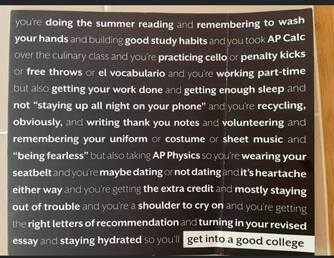|
9/24/2021 0 Comments The Pressure to Perform Sometimes life weighs you down. As an adult, that weight may be the pressures of work and caretaking—of children, parents, spouses, friends, and community. For athletes, though, it’s usually the pressures of performing academically and athletically and of the future that weigh them down. We have done such a good job of stressing the importance of making good decisions to our kids, that we have collectively managed to create a generation of youth that is breaking under the weight of future expectations. I came across this photo on a friend’s facebook the other day (source unknown) and it really hit home. If reading this leaves you breathless, imagine how it must feel to a teenager that’s trying to live it. These are very privileged worries that don’t involve food insecurity, homelessness, abuse, or violence of any kind, but they are real worries for many kids. When did childhood become such a race to cram in all the information and achievements? When did it become all or nothing? I’ve written a bit about the need to drop the ball as an adult… there are just some things we have to let go of to maintain our mental and physical health. As parents and coaches, it’s our responsibility to not only teach kids about good choices but also about resilience and perspective. They don’t have to kill it on every assignment, and it’s ok if they skip a couple of days of piano practice if they need a bit of extra sleep. We have to teach them to juggle it all, how to choose which ball to drop when, and how to respond appropriately when they choose incorrectly.
0 Comments
 Leaving competitive sports behind is a lot like breaking up with a significant other. Either you're the one who chooses to end it, or someone or something chooses for you. When you retire from sports, sometimes it’s because you don’t make the cut for the team, or maybe you have a career-ending injury, you graduate, a parent loses a job or they get divorced, or maybe you just don’t love it enough anymore to keep making the required sacrifices. Or maybe a tragedy (or pandemic) leads your peers to grow apart and your family to reevaluate your current financial and emotional investment. No matter the reason, leaving competitive sports almost always entails an agonizing transition for an athlete. |
Author // the skating yogiMy name is Sarah Neal. I have been immersed in the world of figure skating for over four decades. I have seen firsthand the abuse that happens at the higher levels of our sport and experienced how that trickles down into unhealthy training practices and habits at the grassroots. I have seen this play out in the operations of the very institutions that control our sport. Whether for a profession or hobby, pursuing skating should be a joyful, rewarding process, an opportunity for athletic and personal growth, and a place to build lasting friendships. Archives
March 2024
CategoriesAll Athlete Well Being Athlete Well-Being Deep Connections Embodied Movement And Meditation Practices Life After Competition Mindful Living |
Search by typing & pressing enter

 RSS Feed
RSS Feed